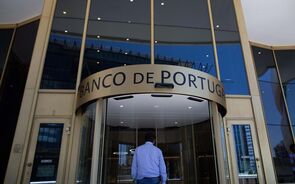German Growth Forecasts Lowered .. (outra vez)
6 mensagens
|Página 1 de 1
Sobre este assunto, tenho a leve impressão de que haverá um posicionamento estratégico gradual que leve o DAX a subir.
Alguns players não estão preocupados com o crescimento económico corrente.
Deverão estar já a pensar numa reprise do passado.
Sempre que há um alargamento da Comunidade/União Europeia, a Economia Alemã alarga o seu espaço vital. Desta feita, corresponde mesmo ao espaço físico que já andava na mira da Alemanha de Hitler.
A Alemanha vai beneficiar em larga escala da entrada de países como a Hungria, a antiga Checoslováquia, hoje dividida em dois, Polónia, países bálticos, Eslovénia (estes sempre foram quase Alemães), para não falar dos restantes de somenos importância.
Isto sim, é mais um empurrão para a Alemanha e para a Europa em geral. Já é um espaço com mais de 400 milhões de habitantes, totalizando agora um PIB próximo ao dos EUA.
Se isto não animar o DAX, não sei o que o fará...
Um abraço
djovarius
Alguns players não estão preocupados com o crescimento económico corrente.
Deverão estar já a pensar numa reprise do passado.
Sempre que há um alargamento da Comunidade/União Europeia, a Economia Alemã alarga o seu espaço vital. Desta feita, corresponde mesmo ao espaço físico que já andava na mira da Alemanha de Hitler.
A Alemanha vai beneficiar em larga escala da entrada de países como a Hungria, a antiga Checoslováquia, hoje dividida em dois, Polónia, países bálticos, Eslovénia (estes sempre foram quase Alemães), para não falar dos restantes de somenos importância.
Isto sim, é mais um empurrão para a Alemanha e para a Europa em geral. Já é um espaço com mais de 400 milhões de habitantes, totalizando agora um PIB próximo ao dos EUA.
Se isto não animar o DAX, não sei o que o fará...
Um abraço
djovarius
Cuidado com o que desejas pois todo o Universo pode se conjugar para a sua realização.
Sim, malditos velhadas insensíveis e crueis do BCE, que nos querem destruir a todos!
Dá até a impressão que se divertem com as nossas dificuldades! Malditos!
É bem óbvio que a culpa não é das legislações bloqueantes, do extremo "burocratismo", e dos desregrados gastos dos nossos estados sociais europeus.
Não!
A culpa é do BCE...
E do patronato...
E, claro, do GW Bush, esse tirano burro, agressivo e criminoso que chegou ao poder desvirtuando a vontade popular através duma clara manipulação das eleições da Florida!
(Hoje sinto-me assim, próximo dos meus habituais inimigos esquerdistas...)
Dá até a impressão que se divertem com as nossas dificuldades! Malditos!
É bem óbvio que a culpa não é das legislações bloqueantes, do extremo "burocratismo", e dos desregrados gastos dos nossos estados sociais europeus.
Não!
A culpa é do BCE...
E do patronato...
E, claro, do GW Bush, esse tirano burro, agressivo e criminoso que chegou ao poder desvirtuando a vontade popular através duma clara manipulação das eleições da Florida!
(Hoje sinto-me assim, próximo dos meus habituais inimigos esquerdistas...)
Earthlings? Bah!
- Mensagens: 1541
- Registado: 20/11/2003 11:37
German Growth Forecasts Lowered .. (outra vez)
Bem,,, 6 "leading economic institutes" alemães ... mais uma vez... baixaram as perpectivas de crescimento da "bomda de ar" da UE.
Entretanto o DAX continua a "incorporar" um presente brilhante e a perspectivar um futuro de médio-prazo ainda mais brilhante... continuando numa de upa-upa.
Daqui a uns tempos.. entre feridos e mortos... vamos ver quem teve mais sobreviventes... bulls ou bears.
European Economies: German Growth Forecasts Lowered (Update1)
Last Updated: April 27, 2004 10:46 EDT
April 27 (Bloomberg) -- Germany's six leading economic institutes lowered their forecast for growth this year as companies shed jobs and consumer confidence stalls.
Europe's largest economy will grow 1.5 percent in 2004, the institutes said, paring an October forecast of 1.7 percent. The pace of expansion will hold at 1.5 percent next year, the state- funded institutes said in a twice-yearly report, presented in Berlin, that forms the basis of the government's own forecasts.
``Private consumption still isn't driving growth as people remain worried about their income prospects,'' Hans Dietrich von Loeffelholz, an economist at the Essen-based RWI institute, one of the six, said in an interview. ``Growth is too weak to generate jobs and ease Germany's budget problems.''
The worsening outlook may frustrate Finance Minister Hans Eichel's attempts to bring the 2005 budget deficit below the European Union's limit after breaching it for three years, the institutes said. Eichel, 62, told European Central Bank President Jean-Claude Trichet Saturday that interest rates are hampering a recovery, a European official said.
Germany's deficit will be 3.7 percent of gross domestic product this year and 3.5 percent of GDP in 2005, exceeding the EU's limit of 3 percent, the institutes predict. Their forecast assumes rates in the dozen-nation euro economy will remain at the current six-decade low at least through 2005.
``The state of public finances in Germany continues to be strained, the budget deficit high,'' the institutes said in their report. The government should cut spending by 5.5 billion euros ($6.5 billion) this year and 6.5 billion euros next to comply with EU rules, they suggested.
Jobless Rise
German consumer confidence stagnated for a seventh month in April, a survey by the GfK AG market research company showed. The number of unemployed rose by the most in a year in March to 4.3 million. In the U.S., by comparison, the economy added 308,000 jobs in March, the biggest gain since April 2000.
Eichel and French Finance Minister Nicolas Sarkozy told Trichet at a Group of Seven meeting Saturday that the ECB's failure to lower borrowing costs was hindering efforts to boost growth, according to the European official who declined to be identified. Trichet defended the bank's decision to leave the benchmark refinancing rate at 2 percent since June, saying the growth outlook is improving.
`Extremely Complicated'
Speaking after the G-7 meeting, Eichel said the outlook for his budget had become ``extremely complicated.'' Crude oil prices, which have risen 40 percent in the past year, presented a ``downward risk'' for growth, he said.
The government, which issues its own growth forecast Friday, will say economic expansion in 2004 will be ``rather at the lower end'' of its previous prediction of 1.5 percent to 2 percent, Economics and Labor Minister Wolfgang Clement told reporters in Berlin today.
``Unemployment figures are bad, industrial production is weak and private consumption is the Achilles' heel of the economy,'' said Otmar Lang, an economist at Deutsche Bank AG, Europe's second- biggest lender, in Frankfurt.
Otto GmbH, the world's largest mail-order company, said sales declined 4.6 percent in the fiscal year through February as the company faced sluggish consumer demand. Hugo Boss AG, Germany's largest clothing maker, expects only a ``slight'' sales increase this year.
`Clearly Worrying'
``We are at fairly low levels of consumer confidence, which translates into very poor consumer demand,'' German Deputy Finance Minister Caio Koch-Weser told the European Parliament's monetary committee yesterday. Budget deficits in the countries sharing the euro were ``clearly worrying'' last year, he said.
Germany's budget shortfall rose to 3.9 percent of gross domestic product last year from 3.5 percent in 2002 and is projected by Eichel to sink to 3.25 percent this year, almost half a point below the institutes' forecast.
The European Commission, the EU's executive branch, expects the German economy to grow 1.8 percent next year, short of the government's 2.25 percent prediction, which forms the basis for the 2005 budget-deficit target of 2.5 percent of GDP.
Two of the six institutes, Berlin's DIW and the Halle-based IWH, said Eichel should ignore the EU's 3 percent deficit limit because Germany ``has been especially hard hit by the economic slowdown'' and the ECB can't tailor its monetary policy to Germany alone.
Unemployment Costs
Payments to Germany's 4.3 million unemployed, representing 10.4 percent of the working population, are punching the biggest hole in the budget. Eichel is planning to transfer 5.2 billion euros this year to bail out the Federal Labor Agency, which administers the payments and had a shortfall of 1.7 billion euros after the year was just two months old.
``In view of the subdued economic expansion, a fundamental improvement of the situation on the labor market is not yet in sight,'' said the institutes. They expect Germany's jobless rate to decline from last year's 10.3 percent to 10.2 percent this year and 10.1 percent in 2005.
The dozen-nation euro economy will expand 1.6 percent this year and grow 2 percent in 2005, the institutes said. The U.S. economy, the world's largest, will grow 4.7 percent in 2004 and advance 3.3 percent next year, they said.
Confidence in the U.S. economy rose more than expected this month as strong job growth boosted sentiment about current conditions to the highest in almost two years, according to a private survey published today. The New York-based Conference Board's consumer confidence index rose to 92.9 from a revised 88.5 in March.
Euro's Decline
Germany may avoid a fourth year of stagnation should the euro resume its decline against the U.S. dollar. Anton Boerner, president of Germany's BGA wholesalers' and exporters' association representing 135,000 companies, yesterday predicted a ``clear weakening'' of the euro in the second half and said exporters can ``breathe a sigh of relief.''
German business confidence unexpectedly rose for the first time in three months in April, helped by the euro's retreat and a brighter outlook for exporters, the Ifo institute said yesterday. Exports account for about 30 percent of the German economy. The euro has fallen more than 5 percent against the dollar this year and was trading at $1.1914 at 4:34 p.m. in Berlin.
The six institutes are Munich's Ifo; Kiel's IfW Institute for World Economics; Halle's IWH institute; the RWI; Hamburg's HWWA institute and the Berlin-based DIW German Institute for Economic Research.
Entretanto o DAX continua a "incorporar" um presente brilhante e a perspectivar um futuro de médio-prazo ainda mais brilhante... continuando numa de upa-upa.
Daqui a uns tempos.. entre feridos e mortos... vamos ver quem teve mais sobreviventes... bulls ou bears.
European Economies: German Growth Forecasts Lowered (Update1)
Last Updated: April 27, 2004 10:46 EDT
April 27 (Bloomberg) -- Germany's six leading economic institutes lowered their forecast for growth this year as companies shed jobs and consumer confidence stalls.
Europe's largest economy will grow 1.5 percent in 2004, the institutes said, paring an October forecast of 1.7 percent. The pace of expansion will hold at 1.5 percent next year, the state- funded institutes said in a twice-yearly report, presented in Berlin, that forms the basis of the government's own forecasts.
``Private consumption still isn't driving growth as people remain worried about their income prospects,'' Hans Dietrich von Loeffelholz, an economist at the Essen-based RWI institute, one of the six, said in an interview. ``Growth is too weak to generate jobs and ease Germany's budget problems.''
The worsening outlook may frustrate Finance Minister Hans Eichel's attempts to bring the 2005 budget deficit below the European Union's limit after breaching it for three years, the institutes said. Eichel, 62, told European Central Bank President Jean-Claude Trichet Saturday that interest rates are hampering a recovery, a European official said.
Germany's deficit will be 3.7 percent of gross domestic product this year and 3.5 percent of GDP in 2005, exceeding the EU's limit of 3 percent, the institutes predict. Their forecast assumes rates in the dozen-nation euro economy will remain at the current six-decade low at least through 2005.
``The state of public finances in Germany continues to be strained, the budget deficit high,'' the institutes said in their report. The government should cut spending by 5.5 billion euros ($6.5 billion) this year and 6.5 billion euros next to comply with EU rules, they suggested.
Jobless Rise
German consumer confidence stagnated for a seventh month in April, a survey by the GfK AG market research company showed. The number of unemployed rose by the most in a year in March to 4.3 million. In the U.S., by comparison, the economy added 308,000 jobs in March, the biggest gain since April 2000.
Eichel and French Finance Minister Nicolas Sarkozy told Trichet at a Group of Seven meeting Saturday that the ECB's failure to lower borrowing costs was hindering efforts to boost growth, according to the European official who declined to be identified. Trichet defended the bank's decision to leave the benchmark refinancing rate at 2 percent since June, saying the growth outlook is improving.
`Extremely Complicated'
Speaking after the G-7 meeting, Eichel said the outlook for his budget had become ``extremely complicated.'' Crude oil prices, which have risen 40 percent in the past year, presented a ``downward risk'' for growth, he said.
The government, which issues its own growth forecast Friday, will say economic expansion in 2004 will be ``rather at the lower end'' of its previous prediction of 1.5 percent to 2 percent, Economics and Labor Minister Wolfgang Clement told reporters in Berlin today.
``Unemployment figures are bad, industrial production is weak and private consumption is the Achilles' heel of the economy,'' said Otmar Lang, an economist at Deutsche Bank AG, Europe's second- biggest lender, in Frankfurt.
Otto GmbH, the world's largest mail-order company, said sales declined 4.6 percent in the fiscal year through February as the company faced sluggish consumer demand. Hugo Boss AG, Germany's largest clothing maker, expects only a ``slight'' sales increase this year.
`Clearly Worrying'
``We are at fairly low levels of consumer confidence, which translates into very poor consumer demand,'' German Deputy Finance Minister Caio Koch-Weser told the European Parliament's monetary committee yesterday. Budget deficits in the countries sharing the euro were ``clearly worrying'' last year, he said.
Germany's budget shortfall rose to 3.9 percent of gross domestic product last year from 3.5 percent in 2002 and is projected by Eichel to sink to 3.25 percent this year, almost half a point below the institutes' forecast.
The European Commission, the EU's executive branch, expects the German economy to grow 1.8 percent next year, short of the government's 2.25 percent prediction, which forms the basis for the 2005 budget-deficit target of 2.5 percent of GDP.
Two of the six institutes, Berlin's DIW and the Halle-based IWH, said Eichel should ignore the EU's 3 percent deficit limit because Germany ``has been especially hard hit by the economic slowdown'' and the ECB can't tailor its monetary policy to Germany alone.
Unemployment Costs
Payments to Germany's 4.3 million unemployed, representing 10.4 percent of the working population, are punching the biggest hole in the budget. Eichel is planning to transfer 5.2 billion euros this year to bail out the Federal Labor Agency, which administers the payments and had a shortfall of 1.7 billion euros after the year was just two months old.
``In view of the subdued economic expansion, a fundamental improvement of the situation on the labor market is not yet in sight,'' said the institutes. They expect Germany's jobless rate to decline from last year's 10.3 percent to 10.2 percent this year and 10.1 percent in 2005.
The dozen-nation euro economy will expand 1.6 percent this year and grow 2 percent in 2005, the institutes said. The U.S. economy, the world's largest, will grow 4.7 percent in 2004 and advance 3.3 percent next year, they said.
Confidence in the U.S. economy rose more than expected this month as strong job growth boosted sentiment about current conditions to the highest in almost two years, according to a private survey published today. The New York-based Conference Board's consumer confidence index rose to 92.9 from a revised 88.5 in March.
Euro's Decline
Germany may avoid a fourth year of stagnation should the euro resume its decline against the U.S. dollar. Anton Boerner, president of Germany's BGA wholesalers' and exporters' association representing 135,000 companies, yesterday predicted a ``clear weakening'' of the euro in the second half and said exporters can ``breathe a sigh of relief.''
German business confidence unexpectedly rose for the first time in three months in April, helped by the euro's retreat and a brighter outlook for exporters, the Ifo institute said yesterday. Exports account for about 30 percent of the German economy. The euro has fallen more than 5 percent against the dollar this year and was trading at $1.1914 at 4:34 p.m. in Berlin.
The six institutes are Munich's Ifo; Kiel's IfW Institute for World Economics; Halle's IWH institute; the RWI; Hamburg's HWWA institute and the Berlin-based DIW German Institute for Economic Research.
-
Info.
6 mensagens
|Página 1 de 1
Quem está ligado:
Utilizadores a ver este Fórum: GaussSLB47, Goya777, iniciado1, latbal, m-m, malakas, Manchini888, Mr.Warrior, MR32, nbms2012, nunorpsilva, OCTAMA, Olhar Leonino, PAULOJOAO, portwine1, StockRider!, trilhos2006, TTM62, yggy e 123 visitantes



